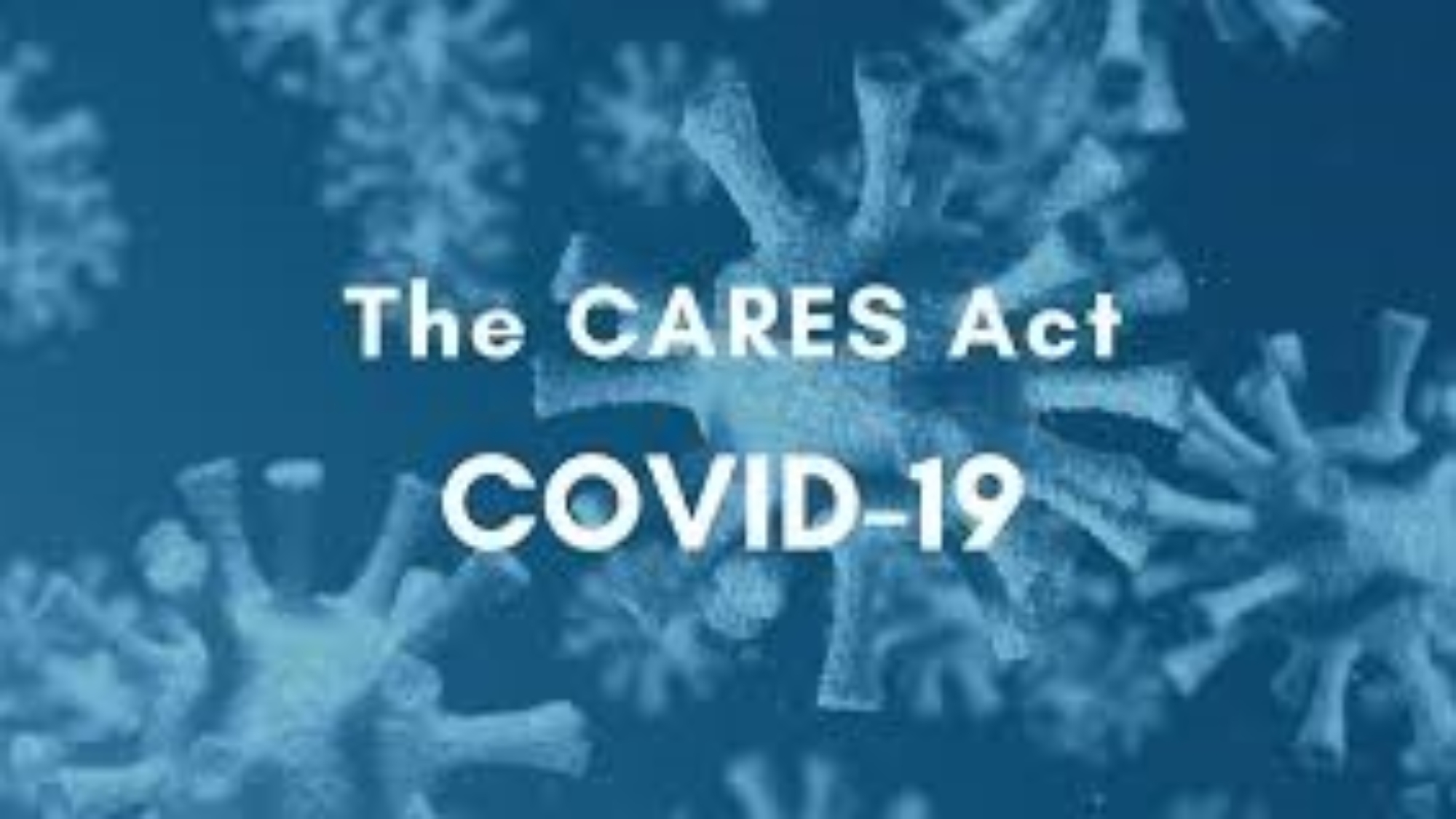Largest Stimulus Package Ever
What is the CARES Act?
The Coronavirus Aid, Relief and Economic Security Act (“CARES Act”) was enacted to provide emergency assistance and health care response for individuals, families, and businesses affected by the 2020 coronavirus pandemic. The bill was introduced to the Senate on March 19, 2020, passed by the Senate on March 25, and utilizing a “voice vote” rather than a “recorded vote”, was passed by the House on March 27, 2020 and signed by President Trump the same day.

The Act impacts many areas including public health and education. In this article we will only discuss components related to changes in the Internal Revenue Code (“IRC”) and the small business emergency loan program.
Components of the CARES Act:
- Paycheck Protection Program;
- Delay of 2019 Filing Deadlines and Payments;
- Specific Business Payroll Provisions;
- Temporary Repeal of Certain Tax Cuts and Jobs Act of 2017 (“TCJA”) Provisions; and
- Individual Credits and Incentives
1. Paycheck Protection Program
The Paycheck Protection Program (“PPP”) is designed to provide a direct incentive for small businesses to keep their workers on payroll by providing each small business a loan up to $10 million for payroll and certain other expenses. If all employees are kept on payroll for eight weeks, the Small Business Administration (“SBA”) will forgive the portion of the loans used for payroll, rent, mortgage interest, or utilities, up to 100 percent forgiveness. Available for businesses (including self-employed) with 500 or fewer employees.
2. Delay of 2019 Filing Deadlines and Payments
The deadline for income tax returns due April 15 has been extended to July 15, 2020. Both filing and payments are automatically extended with no requirement to file an extension request using Form 7004. However, if an extension is still required beyond July 15, 2020 (extending to September or October), the proper extension form must be filed and taxes paid by July 15, 2020.
The Act also delays estimated tax payments for both individuals and corporations until October 15, 2020, treating all installments as one installment due on such date.
Notice 2020-18, which supersedes Notice 2020-17, clarified that certain informational, non-income tax, filings are still due April 15th.
Individuals who file Foreign Bank and Financial Account Reports (“FBAR”, Financial Crimes Enforcement Network “FinCEN” Form 114) should be aware that FBAR is not part of the income tax return. However, the Surface Transportation and Veterans Health Care Choice Improvement Act of 2015 grants FBAR filers an automatic six-month extension (until October 15th), so it is unlikely a separate extension would be provided under the CARES Act. As of the date of this article, the FinCEN website (https://www.fincen.gov/report-foreign-bank-and-financial-accounts) did not list any change in due date for COVID-19.
Notice 2020-20 does specifically extend the deadline for Estate and Gift Tax returns through July 15th, as estate and gift taxes are not part of the income tax return.
3. Specific Business Payroll Provisions
The CARES Act provides for both:
- Employee Retention Credits – a refundable payroll tax credit equal to 50% of wages paid by an employer whose operations were fully or partially suspended or had a gross receipts decline of more than 50% when compared to the same quarter in a prior year.
- Deferral of Employer Payroll Taxes – the employer portion of Social Security taxes (6.2%) can be deferred two years, with half due at year-end 2021 and then remaining due year-end 2022.
4. Amendment to Certain TCJA Provisions
The TCJA implemented several measures designed to limit reductions against taxable income. Certain of those limiting provisions are now suspended until 2021.
- Net Operating Losses – while the TCJA repealed the ability to carryback NOLs and imposed an 80% limitation on the use of NOLs (i.e., effectively creating a 20% minimum tax), the CARES Act now allows for losses incurred 2018-2020 to be carried back five years and NOLs incurred before 2021 can offset 100% of current taxable income.
- Limitation on Business Interest – while the TCJA updated Section 163(j) to limit business interest deductions further by only allowing an interest deduction equal to 30% of the business’ adjusted gross income (down from 50%), the CARES Act now temporarily increases the interest deduction threshold back up to 50% of the adjusted taxable income for 2019 and 2020. Further, a taxpayer can elect to use 2019 income for 2020 tax year; potentially allowing for a larger interest deduction.
- Qualified Improvement Property – the definition of 15-year property under Section 168 was amended to include qualified improvement property, allowing the property to be eligible for bonus depreciation. The amendment is effective as if included in the TCJA; therefore, taxpayers have an ability to claim refunds in regards to accelerating past depreciation for tax years beginning after December 31, 2017.
5. Individual Credits and Incentives
- Recovery Rebates – For the 2020 tax year, individuals with adjusted gross income (“AGI”) less than $99,000 ($198,000 joint return) are eligible for a tax credit up to $1,200 ($2,400 joint return). There is a 5% phase-out starting at $75,000 ($150,000 joint return). For Individuals with AGI below the $75,000 ($150,000 joint return) threshold, the rebate is limited to the lesser of net income tax liability or $1,200, but not below $600. Further, to be eligible an individual must have either (1) qualifying income of at least $2,500, or (2) a net income tax liability which is greater than zero, and gross income which is greater than the standard deduction. While the recovery rebate is based on the 2020 tax year, the IRS will issue checks in the next 3 weeks until December 31, 2020 based on the 2019 tax return (or 2018 tax return if 2019 has not yet been filed). The check is considered an advance against any 2020 tax year refund due after taking the recovery rebate credit into account.
- Withdrawals from Retirement Plans – Section 72(t) does not apply to coronavirus-related distributions, specifically allowing early distribution penalties to be waived on distributions of up to $100,000 made on or after March 27, 2020 and before December 31, 2020. The income tax due on retirement distributions is spread ratably over a 3-year-period including the year of distribution. Further, the limit on loans made from a solo 401(k) were increased from $50,000 to $100,000.
- Charitable Contributions – For tax years beginning in 2020, up to $300 of charitable contributions are available as a deduction “above the line” (i.e., a deduction which reduces AGI, a limiting factor for many tax incentives).
- Employer Education Payments – For employer paid student loan repayments made prior to January 1, 2021, the amount of repayment is not included in the employee’s taxable compensation.
CARES Act: Full Version
Read the law first hand, below is a copy of the statutory language from Congress’ website.
International Tax Advisors, Inc. can help you understand how to react to this new legislation and maintain effective strategies to avoid overpaying tax. Contact us now, 305-423-0221.



[…] The CARES Act was enacted on March 27, 2020 to provide emergency assistance and health care response for individuals, families, and businesses affected by the 2020 coronavirus pandemic. The CARES Act includes many components, tax and non-tax related. See ITA’s Article: Tax Saving Components of the CARES Act […]